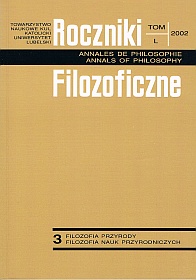Potentiality as a Source of Becoming in Aristotelian Philosophy
Abstract
Nothing comes from nothing because nothingness is nothing. And nothing comes from being because being is already there. Hence, how is becoming and perishing possible? This problem should be resolved by those who wish to understand and explain the visible world, because it is full of things that begin to exist. There can be no science about changing individuals, so the world of genesis and nature should be left to "doxa". Such was also the choice of Socrates and Platon. Aristotle decided otherwise and created the first scientific theory of nature, a theory that dominated for over 1,500 years.
My article is based on reflections on Aristotle's physics and metaphysics. First, I show how Aristotle solved ontological, logical and epistemological difficulties by dealing with the problem of genesis. The central issue here is Aristotle's concept of dynamics as the chief term for solving the problem. This term itself is problematic. It breaks down into many other issues when translated into Latin and other languages, and ultimately becomes an active as opposed to a passive possibility. This, it seems, raises many philosophical and theological questions. I tried to formulate some of them at the end of the article.
Copyright (c) 2002 Roczniki Filozoficzne

This work is licensed under a Creative Commons Attribution-NonCommercial-NoDerivatives 4.0 International License.





